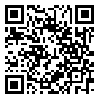1. Bahrami N, Najafvand Derikvandi S, Bahrami S, Karami Varnamkhsti P, Mehdi Pourkoorani L. [The Status of Emotional Intelligence and its Association with Demographic Variables among Students of Dezful University of Medical Sciences in 2013]. Jundishapur Scientific Medical Journal. 2015;14(3):283-93.
2. Akbari M, Rezaeian H, Modi M. [Investigation of emotional intelligence of students of Arak University and its relationship with computer anxiety]. Periodical of mental health principles. 2007;9(35-36):129-34.
3. Goleman D, Boyatzis R, McKee A. Primal leadership: Unleashing the power of emotional intelligence: 10th ed. Harvard Business School Press: 2013; pp:102
4. Benson G, Ploeg J, Brown B. A cross-sectional study of emotional intelligence in baccalaureate nursing students. Nurse Educ Today. 2010;30(1):49-53. [
DOI:10.1016/j.nedt.2009.06.006] [
PMID]
5. Por J, Barriball L, Fitzpatrick J, Roberts J. Emotional intelligence: Its relationship to stress, coping, well-being and professional performance in nursing students. Nurse Educ Today. 2011;31(8):855-60. [
DOI:10.1016/j.nedt.2010.12.023] [
PMID]
6. Arefnasab Z, Zare H, Babamahmoodi A. [Emotional Intelligence and Problem Solving Strategy: Comparative Study Basedon" Tower of Hanoi" Test]. Iran J Psychiatry Behav Sci. 2012;6(2):62. [
PMID] [
PMCID]
7. Chew BH, Zain AM, Hassan F. Emotional intelligence and academic performance in first and final year medical students: a cross-sectional study. BMC Med Educ. 2013;13(1):1. [
DOI:10.1186/1472-6920-13-44] [
PMID] [
PMCID]
8. Shechory-Bitton M, David SB, Sommerfeld E. Effect of Ethnicity on Parenting Styles and Attitudes Toward Violence Among Jewish and Arab Muslim Israeli Mothers An Intergenerational Approach. J Cross Cult Psychol. 2015;46(4):508-24. [
DOI:10.1177/0022022115576001]
9. Webster-Stratton C, Herman KC. The impact of parent behavior-management training on child depressive symptoms. J Couns Psychol. 2008;55(4):473-84. [
DOI:10.1037/a0013664] [
PMID]
10. Baumrind D. The influence of parenting style on adolescent competence and substance use. J Early Adolesc. 1991; 11(1):56-95. [
DOI:10.1177/0272431691111004]
11. Sepehrian F, Saribagloo JA, Mahmoudi H, Ketabi A. [Parenting styles and adolescents' self-esteem: Mediatory role of satisfying basic psychological needs]. International Journal of Behavioral Sciences. 2013;7(2):151-8.
12. Turner EA, Chandler M, Heffer RW. The influence of parenting styles, achievement motivation, and self-efficacy on academic performance in college students. J Coll Stud Dev. 2009;50(3):337-46. [
DOI:10.1353/csd.0.0073]
13. Suchman NE, Luthar SS. Maternal addiction, child maladjustment and socio-demographic risks: Implications for parenting behaviors. Addiction. 2000; 95(9): 1417-28. [
DOI:10.1046/j.1360-0443.2000.959141711.x]
14. Dwairy M. Parenting styles and mental health of Palestinian-Arab adolescents in Israel. Transcult Psychiatry. 2004; 41(2):233-52. [
DOI:10.1177/1363461504043566] [
PMID]
15. Nastas L-E, Sala K. Adolescents' emotional intelligence and parental styles. Procedia Soc Behav Sci. 2012;33:478-82. [
DOI:10.1016/j.sbspro.2012.01.167]
16. Joshi D, Dutta I. A Correlative Study of Mother Parenting Style and Emotional Intelligence of Adolescent Learner. IJISR. 2015; 13(1): 145-51.
17. Asghari MS, Besharat MA. [The relation of perceived parenting with emotional intelligence]. Procedia Soc Behav Sci. 2011;30:231-5. [
DOI:10.1016/j.sbspro.2011.10.046]
18. Sarhaddi M. [Evaluation the relationship between parenting styles and emotional intelligence of gifted and normal students in high Schools of zahedan]. RRAMT.2014; 40(1): 94-9.
19. Mohammadyari G. [The Relationship Between Parental Style and Emotional Intelligence among Students of Payame Noor University]. Proceeding of the Global Summit on Education. 2013: 853-8.
20. Sarmad Z, Bazargan A, Hejazi E. [Research methods in behavioral sciences]. Tehran: Agah Publications. 2004.
21. Ghasemi Jobaneh R, Arab Zadeh M, Jalili Nikoo S, Mohammad Alipoor Z, Mohsenzadeh F. [Survey the validity and reliability of the persian version of short form of freiburg mindfulness inventory]. Journal of Rafsanjan University of Medical Sciences. 2015;14(2):137-50.
22. Hossienzad A, Alizadeh S, Khademi A, Mosarezaie Moqaddam A. [Comparison of Personality Traitsandemotional Intelligence in Female and Male Patients with Multiple Sclerosis]. Urmia Medical Journal. 2015;26(1):81-91.
23. Moradian J, Alipour S, Shehni Yailagh M. [The causal relationship between parenting styles and academic performance mediated by the role of academic self-efficacy and achievement motivation in the students]. Family Psychology. 2014; 1(1):63-74.
24. Shekarbeygi AR, Yasaminejad P. [Comparison of parenting styles, self-esteem and general health of deliquent and normal adolescents in Kermanshah]. Journal of Family Counseling and Psychotherapy. 2012; 2(2):178-92.
25. Shalini A, Acharya Y. Perceived Paternal Parenting style on Emotional Intelligence of Adolescents. Guru Journal of Behavioral and Social Sciences. 2013;1(4):194-202.
26. Abdollahi A, Abu Talib M, Motalebi SA. [Perceived parenting styles and emotional intelligence among Iranian boy students]. Asian Journal of Social Sciences & Humanities. 2013;2(3):460-7.
27. Lee S-J, Li L, Thammawijaya P. Parenting styles and emotional intelligence of HIV-affected children in Thailand. AIDS Care. 2013;25(12):1536-43. [
DOI:10.1080/09540121.2013.793264] [
PMID] [
PMCID]
28. Chen FS, Lin YM, Tu CA. A study of the emotional intelligence and life adjustment of senior high school students. World transactions on engineering and technology education. 2006;5(3):473-6.
29. Zakeri H, Karimpour M. [Parenting styles and self-esteem]. Procedia Soc Behav Sci. 2011;29:758-61. [
DOI:10.1016/j.sbspro.2011.11.302]
30. Markazi L, Badrigargari R. [The Role of Parenting Self-Efficacy and Parenting Styles on Self-Regulation Learning in Adolescent Girls of Tabriz]. Procedia Soc Behav Sci. 2011;30:1758-60. [
DOI:10.1016/j.sbspro.2011.10.339]





